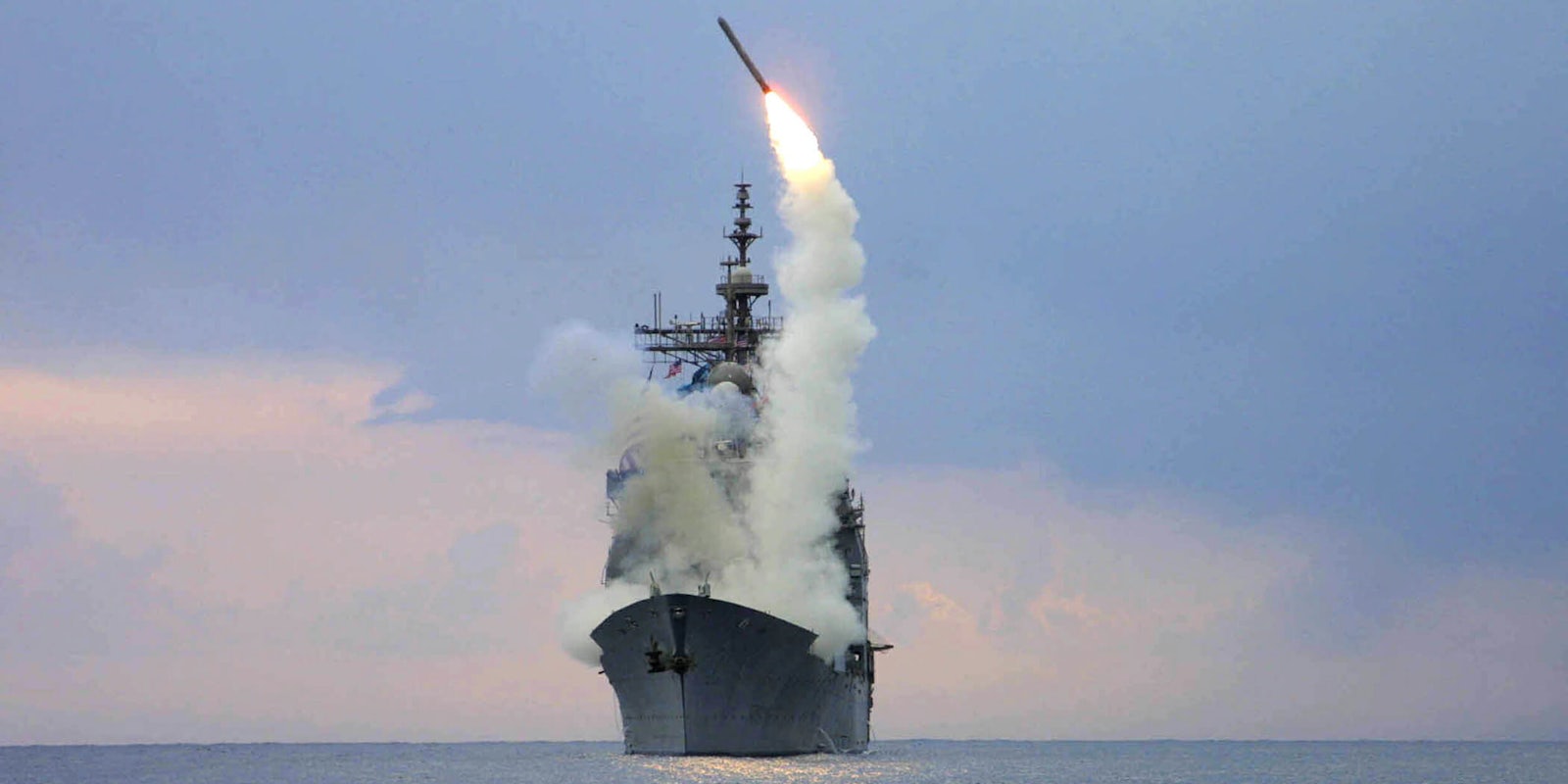The United States military on Thursday attacked Syrian dictator Bashir al-Assad’s forces for the first time since the country’s civil war began in an action that has split the international community and could dramatically change the geopolitical landscape.
The White House had, until now, backed Turkish-led peace talks with the Syrian government and, although it had engaged in military efforts against the so-called Islamic State, President Donald Trump appeared uninterested in removing Assad.
The airstrikes, then, represent a major escalation. Here’s what you need to know.
Why did President Trump launch the attack?
A devastating chemical weapons attack, which Syria’s government carried out on Tuesday, triggered international outrage when it killed at least 80 Syrian civilians, including children, in the rebel-held town of Khan Sheikhoun, located the country’s north-western Idlib province. Victims are believed to have been exposed to the deadly odorless neurotoxic agent Sarin, according to autopsies by Turkey’s health ministry. The poison causes, among a host of other symptoms, a potentially fatal build-up of fluid or blood in the lungs, unconsciousness, severe convulsions, and death.
Rescue workers and activists at the scene began to post photos and videos on social media that showed victims, many of whom were young children, asphyxiated and foaming at the mouth.
As outcry surrounding the use of chemical weapons rose, the Syrian government issued a statement denying the charge and claiming it had “never used them, anytime, anywhere, and will not do so in the future.”
Russia, Syria’s close ally, suggested without evidence that Assad’s bombs had merely hit a rebel weapon facility: “On the territory of the depot, there were workshops which produced chemical warfare munitions.”
How did the U.S. respond?
On Thursday evening, Trump ordered missile strikes targeting Shayrat airfield, an Assad regime military base from which, the Trump administration says, the chemical weapons attack was launched.
Two U.S. Navy warships stationed in the eastern Mediterranean Sea fired 59 Tomahawk cruise missiles at around 8:40pm (EST). The Pentagon described the response as “proportional” in a press release and said that they had sought to hit “targeted aircraft, hardened aircraft shelters, petroleum and logistical storage, ammunition supply bunkers, air defense systems, and radars.”
Russia’s military was notified in advance of the attack to avoid Russian personnel casualties.
How effective was the attack?
According to a Russian military report issued on Friday morning, only 23 of the 59 missiles successfully reached the air base. Although the runway is still intact and usable, six Syrian MiG-23 jets had been destroyed and at least six soldiers were killed.
How has the Syria government reacted?
The office of dictator Assad slammed the attack as “reckless,” “irresponsible… illegal” and “shortsighted.”
https://twitter.com/News_Executive/status/850308048300146688
According to the Associated Press, the country’s foreign ministry called the attack “a flagrant aggression” and said the purpose of the U.S. action was to “weaken the strength of the Syrian army in confronting terrorist groups.” The Syrian army’s Chief of General Staff, Ali Ayyoub, said the White House had used the allegation of a chemical weapons attack as a “pretext” for “blatant aggression.”
Meanwhile, the U.S. strike was praised by the opposition coalition within the country.
We hope that #US airstrikes will continue to prevent #Assad‘s airforces from launching new raids & to amount to an int’l protection of CIVs
— Syrian Coalition (@SyrCoalition) April 7, 2017
The Free Syrian Army, the primary rebel group fighting the regime, were also pleased. They released a statement saying that U.S. “responsibility is still big and does not end with this operation.”
What about Russia and Iran, Syria’s allies?
Russian President Vladimir Putin has supported the Syrian government and Assad as its leader throughout the war. As such, following the Assad regime’s line, Kremlin spokesman Dmitry Peskov said that Putin regards the action as “an aggression against a sovereign state in violation of the norms of international law, and under a trumped-up pretext at that … Washington has struck a significant blow to Russian-American relations, which were already in a sorry state.”
Russian Major General Igor Konashenkov said that a “complex of measures” would be taken by Russia to help reinforce Syrian air defenses and added that “the combat efficiency of the U.S. strike was very low.”
Iran, a major Shiite nation, opposes the Sunni rebels taking influence in Syria over the secular regime of Assad. As such it finds itself in alignment with Moscow, Tehran released a brief statement to “strongly condemn any unilateral military action.”
Who, within the international community, is supporting the strikes?
Almost immediately, key U.S. allies threw their absolute support behind the bombing raid. The United Kingdom’s foreign ministry, for example, said that it “fully supports” the “appropriate response to a barbaric chemical weapons attack.”
In the region, Saudi Arabia, Jordan, and Turkey all praised the attack. Israeli Prime Minister Benjamin Netanyahu said that, “in both word and action, President Trump sent a strong and clear message today that the use and spread of chemical weapons will not be tolerated.”
“Israel…,” Netanyahu added, “hopes that this message of resolve in the face of the Assad regime’s horrific actions will resonate not only in Damascus, but in Tehran, Pyongyang and elsewhere.”
Other U.S. allies, such as Germany and France, have cautiously voiced their support but remain committed to peaceful negotiations. In a joint statement, German Chancellor Angela Merkel and French President Francois Hollande called for “a political transition in Syria” and said that “President Assad alone carries responsibility for these developments.”


